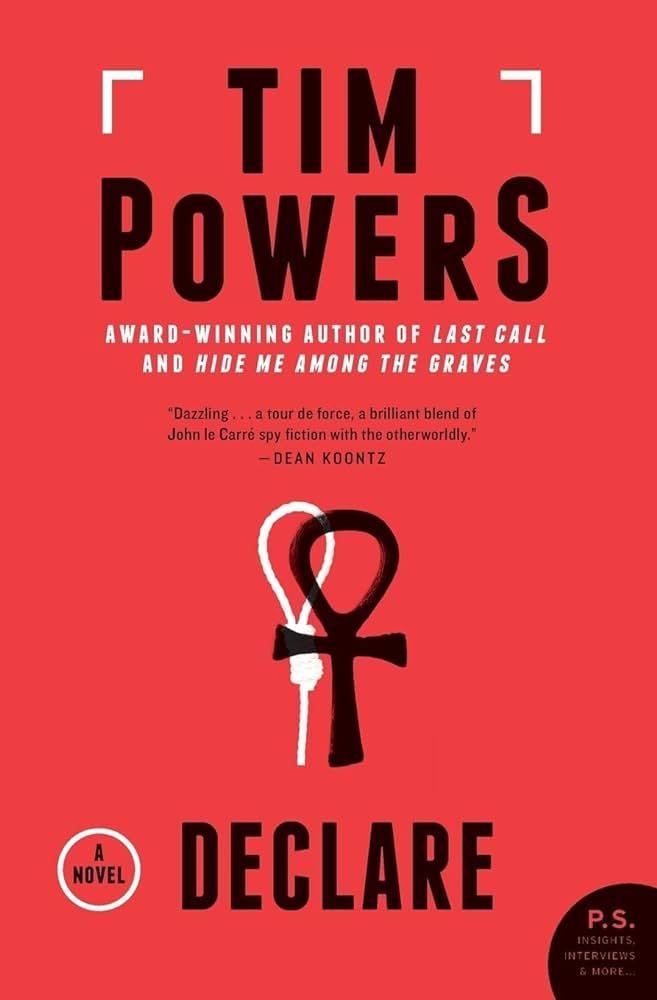Tim Powers on the danger of chasing trends
/Over the last few weeks I’ve been (very, very slowly) reading Declare, a supernatural Cold War espionage thriller by Tim Powers. I reached the halfway point the other night and it’s so continuously involving and intriguing, so brilliantly imagined and deeply realized, and so different even from the science fiction that I occasionally read that I looked for some interviews with Powers. I found several recent ones on YouTube and they haven’t disappointed.
Here’s an excellent exchange from a 57-minute interview with a channel called Media Death Cult. After discussing Powers’s love of Robert Heinlein and the contemporary obsession with how “problematic” he is, Powers and the interviewer consider whether it is possible to write old-fashioned fiction in a world that adheres so dogmatically to the prevailing political pieties:
Media Death Cult: I think it’s easy to pick on [Heinlein] because his heart was in the right place. You know what I mean?
Powers: Yeah, and he suffers from, uh, being dead, uh, in that the current standards of acceptability move on. Harlan Ellison was certainly progressive, liberal, cutting edge in his time, but now being dead, the standards, acceptable norms, have moved on.
MDC: So you think someone like Heinlein or Ellison, if they were to pop up now and want to write like that, it’s just not going to stick because of this weird situation that the Western world seems to be in with the microscope that you’re put under? I think you’d be a fringe writer, wouldn’t you? Which I think is a shame. I think if we can’t get that kind of thing going again it’s a bit of a shame.
Powers: Yeah. I mean, there’ve always been trends, which I think any writer is wise to ignore. Cyberpunk, nanotech, steampunk, uh, have all been flurries that briefly inspired lots of imitations and, you know, follow-alongs, and I always think it’s a big mistake for a writer to do that—to clock what is acceptable right now, what’s popular right now? I will do that. Because at best you’re going to be one of a crowd following along, and, more likely, by the time you finally get on the bandwagon the wheels will have fallen off and it’s overturned in a field somewhere.
MDC: Yeah.
Powers: And I think these days—and I speak from the advantage of complete ignorance—
MDC: Me too.
Powers: Ha! I think there are a number of bases to touch, boxes to check, especially in current science fiction and fantasy, which I think would be detrimental for a writer to pay much attention to. I think we’re going through a sort of tunnel. I think it may not be related but I think it’s alarming that Roald Dahl, RL [Stine] who did those sort of spooky stories for kids, and Ian Fleming and Agatha Christie are having their works retroactively revised to be acceptable to 2003 [sic] standards.
It’s definitely related. Powers’s choice of the tunnel as a metaphor for our cultural moment is fitting, tunnels being narrow, dangerous, and impossible to escape in any way but getting through it.
Just don’t live unto the tunnel, or take on its shape. Do your own thing. Be your own man, write your own stories, and don’t chase the latest trend—especially if that trend is writing to appease the legion of scolds who want to dictate how you must write your story and what you must include. Bowing to this kind of political orthodoxy is the worst way to fit in and be trendy. After all, recent events have demonstrated that you can toe the line—touch every base and check every box, in Powers’s terms—and still fall afoul of the mob. A lesson anyone familiar with Bolshevism should know.
Powers and his interviewer do, however, offer a hopeful vision of the future:
MDC: You got this kind of weird landscape where everybody is—you’re right, you’re writing through this tunnel. I think we’ll come out of the other side of it, though. There is pushback.
Powers: Oh, yeah.
MDC: And it’s not just the old school who are old enough to have enjoyed these things before the world started turning woke or whatever it is. I think there is a movement, there is pushback on it. We don’t want art to be that way. We don’t want it.
Powers: Yeah, yeah. And certainly, you think, ‘Well, it’s old now, the original text of Fleming and Agatha Christie.’ But then, when I was reading Heinlein, Sturgeon, Leiber, Murray Leinster, Henry Kuttner, those were all before my time. Those weren’t new writers. I was, you know, digging around used book stores and, yeah—I don’t think the readership is going to confine itself to the new editions. I think readers are hungry enough to dig widely.
The used book store may well prove to be the ashes from which literature will resurrect itself. But first we have to pass through the tunnel.
Good stuff, and there’s more I could have included. There’s a lengthy section in which Powers talks about his friendship with Philip K Dick that was especially good. Check out the entire interview at the link above or in the embedded YouTube player.
Special thanks to those of y’all who’ve recommended Declare to me at some point, especially David and Chet. I’m enjoying it so much that I’ve already picked up Powers’s supernatural pirate epic On Stranger Tides, which looks amazing, and I’d be glad to hear from other Powers fans which of his other books would be good to look into after that. I’ve already heard good things about Last Call. In the meantime, I’m trying to make time between work and the commute and feeding babies all night to finish Declare. Looking forward to all the big revelations along the way.





